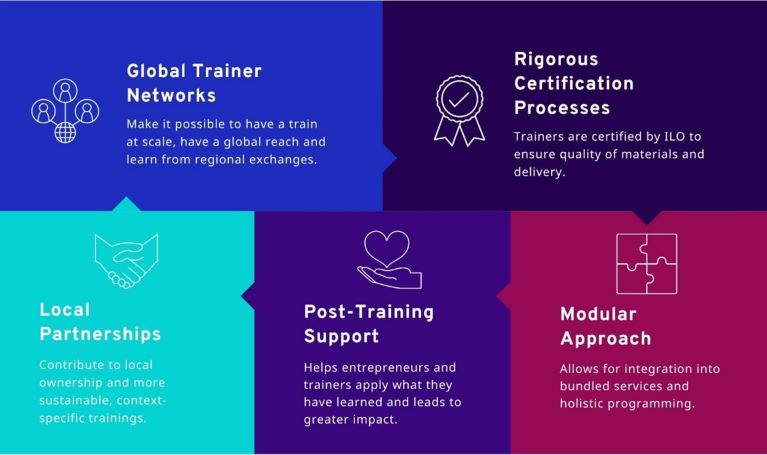Training and post-training support for women entrepreneurs
Trainings and post-training support can equip women with the skills and competencies they need to start and manage a business, and to take advantage of emerging market opportunities. They can be important tools in enhancing women’s business know-how, agency, and confidence, and can be particularly impactful when they cater to women’s needs and circumstances, are offered as part of bundled services and within the framework of holistic intervention models.
The ILO’s Women’s Entrepreneurship Development (ILO-WED) programme has over the years, supported the development and roll-out of a series of tested training tools, global trainer networks, and learnings in terms of what works to promote entrepreneurship development. These encompass training programmes training programmes on business skills, cooperative development and financial management.
The ILO-WED programme and SME Unit’s core training packages include the following components:
Start and Improve Your Business (SIYB) – Accompanies entrepreneurs at all stages of business development, from generating a business idea to expanding growth-oriented businesses.
Financial Education – Designed for vulnerable groups to build their financial knowledge and management skills.
Our.Coop – Training programmes on different stages of cooperative development, from an introduction to cooperative models to improved governance and services.
The ILO’s Women’s Entrepreneurship Development (ILO-WED) programme has over the years, supported the development and roll-out of a series of tested training tools, global trainer networks, and learnings in terms of what works to promote entrepreneurship development. These encompass training programmes training programmes on business skills, cooperative development and financial management.
The ILO-WED programme and SME Unit’s core training packages include the following components:

Core training programmes to support women entrepreneurs
Gender and Entrepreneurship Together (GET Ahead) – Designed for women (and men) with basic literacy and numeracy skills to build interpersonal and business management skills. GET Ahead differs from conventional business training materials, as it highlights entrepreneurial skills from a gender perspective, incorporates coaching as a form of post-training support, and is made to address the needs of entrepreneurs with basic literacy and numeracy skills. The modules focus on the basic blocks of a business plan, as well as strengthening interpersonal skills such as negotiation, communication, risk management and decision-making.Start and Improve Your Business (SIYB) – Accompanies entrepreneurs at all stages of business development, from generating a business idea to expanding growth-oriented businesses.
Financial Education – Designed for vulnerable groups to build their financial knowledge and management skills.
Our.Coop – Training programmes on different stages of cooperative development, from an introduction to cooperative models to improved governance and services.